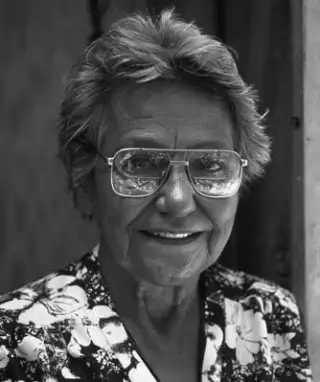Biography of Oodgeroo Noonuccal

| date | place | |
|---|---|---|
| born | November 03, 1920 | Minjerribah, Australia |
| died | September 16, 1993 | Brisbane, Australia |
Oodgeroo Noonuccal, born Kathleen Jean Mary Ruska on November 3, 1920, was a prominent Aboriginal Australian poet, political activist, artist, and educator. She was born on North Stradbroke Island (Minjerribah), Queensland, and became a significant cultural figure in Australia throughout the 20th century. Oodgeroo was the second youngest of seven children in a family with Indigenous heritage. Her father was a Noonuccal descendant, while her mother had mixed Aboriginal and Scottish ancestry. She faced challenges in her early life, including limited educational opportunities, as she left school at the age of 13 to work as a domestic servant in Brisbane. During World War II, Oodgeroo served in the Australian Women's Army Service from 1942 to 1944. This experience exposed her to various social issues and helped shape her advocacy for Aboriginal rights. After the war, she became involved with the Communist Party of Australia due to its opposition to the White Australia policy. Oodgeroo's literary career began in earnest with the publication of her first poetry collection, "We Are Going", in 1964. This book was groundbreaking as it was the first published work by an Aboriginal Australian woman and received critical acclaim despite some skepticism regarding its authorship. Her poetry often addressed themes of Indigenous identity, cultural heritage, and social justice. Notable works include "The Dawn Is At Hand" and various poems that reflect her activism. Her writing style was described as "sloganistic" and aimed at promoting pride in Aboriginal culture and advocating for equality. Throughout her career, she received numerous awards for her contributions to literature and activism, including the Mary Gilmore Medal and honorary doctorates from several universities. In addition to her literary achievements, Oodgeroo was active in various community initiatives. She managed the Noonuccal-Nughie Education Cultural Centre on Stradbroke Island and worked to improve educational programs for Indigenous students. In 1970, she was appointed a Member of the Order of the British Empire (MBE) for her community service but returned the honor in 1987 as a protest against the Australian Bicentenary celebrations, which she viewed as a commemoration of oppression against Indigenous peoples. Oodgeroo passed away from cancer on September 16, 1993, at the age of 72. Her legacy continues through her influential poetry and ongoing recognition of Indigenous rights in Australia. She is remembered not only as a poet but also as a powerful advocate for social change and cultural preservation. Oodgeroo Noonuccal's poetry is a profound reflection of her identity as an Aboriginal Australian and her experiences as a political activist. Her work often addresses themes of colonization, dispossession, and cultural identity, capturing the struggles and resilience of Indigenous peoples. In her seminal poem "We Are Going," she poignantly illustrates the impact of British colonization on Aboriginal Australians, expressing a deep sense of loss while simultaneously celebrating the beauty of her culture. The poem emphasizes the disconnection felt by Indigenous people as they navigate a world that has marginalized them, encapsulating their enduring connection to the land and their heritage. Through evocative imagery and powerful language, Oodgeroo's poetry serves as both a lament for the past and a call for recognition and unity among all Australians. Her first collection, We Are Going, published in 1964, marked a significant milestone as it was the first book of poetry by an Aboriginal Australian woman. Oodgeroo's writing is characterized by its accessible yet poignant style, often employing rhyme and rhythm to engage readers while conveying serious social messages. In poems like "The Past," she reflects on memory and cultural continuity, reinforcing the idea that the past is integral to understanding present identities. Oodgeroo's work not only advocates for Indigenous rights but also fosters a sense of pride within Aboriginal communities, encouraging future generations to embrace their heritage. Her legacy continues to inspire contemporary poets and activists, making her a vital figure in Australian literature and social justice movements.
Feel free to be first to leave comment.